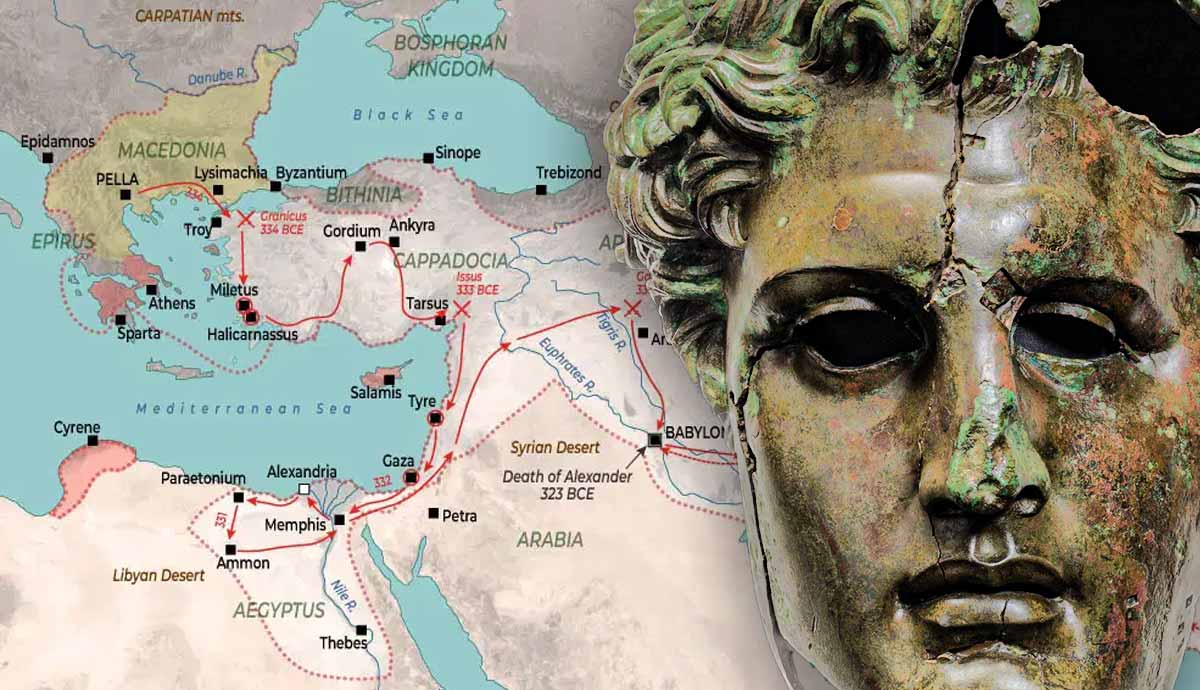
When one mentions pirates, an image springs to mind: a crew of misfits, daredevils and adventurers, in command of a tall ship, proudly flying the black-and-white Jolly Roger. Brave and fearless, those men (and women) attacked ships filled with gold and other treasures and did not shy away from combat against navy vessels sent to stop them. Thousands of years before swashbucklers began spreading fear and panic across the Caribbean, Mediterranean pirates prowled the ancient world. From Gibraltar to the Lebanese coast, they raided merchant ships and threatened vital trade routes. Yet, despite all efforts and all might of the ancient states, piracy could not be stopped. The situation remained unchanged for millennia. Only when the pirates directly threatened Rome’s interests, the Republic organized the massive punitive fleet. Under the command of Pompey the Great, Rome eradicated the piracy, transforming the Mediterranean into Mare Nostrum (Our Sea).
The Ancient Mediterranean and Mediterranean Pirates

Unlike its better-known Caribbean analog, which lasted less than a century, Mediterranean piracy flourished for thousands of years. Its first mentions come from ancient Egypt, but it is reasonable to assume that piracy predated this powerful civilization. This is partly due to the great importance that the Mediterranean Sea, or the Inner Sea, held in the ancient world, and partly due to its geography.
While the Mediterranean region is known as a fertile area, which spawned some of the most significant world civilizations, it should not be forgotten that some parts are rugged and hilly, even mountainous. Instead of agriculture, the inhabitants of those areas relied predominantly on marine resources, including fish, salt, and other fruits of the sea. Most of those people had their own boats, possessed good seafaring skills, and unsurpassed knowledge of the local coastline and sailing routes.

Thus, it should not surprise that during hardships, those men could turn to piracy. We should also keep in mind that before the invention of ocean-going caravels in the 15th century, ships could not cross long distances over open water. Thus, most of the sailing was restricted to a few navigable routes that followed the coastline. Geography itself further benefited the pirates, who used numerous coves to hide their fleet and strike undetected. Caught in a trap, a slow merchant ship laden with goods had no other option but to surrender. In addition, knowledge of the local area helped the pirates to avoid retaliation once the punitive fleet arrived.
One should also add that various governments often resorted to pirates’ services, especially during wartime, employing their skills and numbers against the opponent. A pirate fleet would serve in the first wave of attack, preparing the terrain for the navy. Some of the regions were known for providing safe harbors to pirates, who, in return, boosted their economy. One of the most important commercial activities where pirates played an important role was the slave trade. Thus, it should not come as a surprise that ancient Mediterranean pirates lasted for so long.
Pirates in Ancient Egypt

The first mention of Mediterranean pirates comes from Egypt. The land of the pharaohs was one of the most powerful states at the time. Its trade ships, laden with all sorts of goods, were a tempting target for the pirates. Pharaoh Amenhotep III (1390-1353 BCE) had to establish defenses in the Nile Delta to protect the area against maritime invaders. Those raiders had no allegiance, attacking every ship, paying no attention to its flag. This makes them the first actual pirates recorded in history.
While those ancient swashbucklers had no name, they could be one of the two pirate groups mentioned in accounts written a few decades later, during the reign of Amenhotep’s successor, Akhenaten. The Amarna Letters, extracts of diplomatic correspondence between the pharaoh and his allied and vassal rulers, covered many pressing issues, including piracy. It seems that the pharaoh was troubled by two distinct pirate groups, the Lukka and the Sherden. Despite the Egyptian fleet’s best efforts, they continued to cause substantial disruption to regional commerce and security. In his correspondence with the king of Alashiya (modern Cyprus), the allied king rejected Akhenaten’s claims of his connection to the Lukka (based in modern-day Turkey). The king assured the pharaoh that he introduced countermeasures and was prepared to punish any of his subjects involved in piracy.

The Lukka could belong to the infamous Sea Peoples: a feared and mysterious group of marine marauders who posed a great threat to the ancient Mediterranean states during the 13th and 12th century BCE. Egypt, in particular, waged many battles against those dangerous invaders. Pharaoh Ramesses III, who reigned for most of the first half of the 12th century BCE, was forced to deal with several invasion waves of the Sea Peoples. One of his victories is immortalized on the walls of his mortuary temple in Medinet Habu. Although the Sea Peoples are characterized as the first major pirates of the Mediterranean, their origins, motives, and actions remain a mystery.
Everyday Piracy of Ancient Greece

Unlike ancient Egyptian rulers that had to engage the pirates in mass battles, the Greek world encountered a different sort of piracy. While Egypt’s power was land-based, with fleets patrolling the Nile and the coastline, Greeks relied on the Mediterranean in almost all aspects of life, from trade to religion and warfare. Most important cities were located on the coast, but also on the many Greek islands. Further, Greeks colonized a large area of the Mediterranean, from Turkey to Sicily, founding new cities as far as the Spanish coast. Thus, some of the towns wholly depended on maritime connections for transporting people and goods.
As the Greek world gained power and influence, growing trade attracted Mediterranean pirates. Piracy had deep roots in Greek society and its history. Already in the works of Homer, we can find the mention of piracy. Interestingly, both The Illiad and The Odyssey not only condone, but praise the lifestyle and actions of sea-marauders. The opinion remained unchanged in the following centuries. Thucydides, for instance, glorified pirates’ daring attacks on ships or even cities. For Greeks, piracy was a part of everyday life. A citizen of any city was perfectly free to fit out a ship of his own, raid and capture enemy vessels, and keep the spoils of war. Even high officials were not beyond engaging in such activities. According to the famous orator Demosthenes, in 355 BCE, Athenian ambassadors made a detour from their official travel to capture a ship sailing from Egypt, taking the wealth found onboard for themselves!

The Greeks’ liberal approach towards piracy does not mean that they always tolerated it. But attempts to curtail piracy were hampered by the Greek city-states’ limited power and the large number of pirates operating in the Mediterranean. For that very reason, through the fifth and fourth century BCE, Greek cities employed small-scale measures, including sporadic campaigns to lower the pirate threat and short alliances designed to fight against maritime banditry. They constructed naval bases in the areas known to be dangerous, and used naval escorts to protect vital trade routes.
Not surprisingly, all efforts to stop Mediterranean pirates failed. The only significant attempt was undertaken by Alexander the Great. To secure his merchant shipping, vital for the Persian campaign, Alexander created the first international coalition to combat Mediterranean piracy. However, his sudden death in 323 BCE brought an end to the plan, while his successors failed to organize a similar endeavor. In fact, instead of combating the piracy, Alexander’s successors employed pirates to fight against their enemies, going so far as to incorporate them into their own navies as auxiliaries.
The Most Dangerous of Them All: Illyrian and Cilician Pirates

As the Hellenistic Kingdoms fought each other, using piracy as one of the means of warfare, the rising power of Rome had to resolve its own pirate problem in the western Mediterranean. During the third century BCE, the Illyrian pirates, based in the eastern Adriatic, threatened the trade in the area. Under the infamous queen Teuta, the marauders presented such a danger to Roman commerce that the Republic had to send its fleet. Three Illyrian Wars followed, which ended with the Roman triumph and the death of the last Illyrian king. Yet, the area would be conquered and pacified only under Augustus.
In the eastern Mediterranean, Cilician pirates presented a similar threat to Roman interests. Attacking from well-hidden and protected bases located on the southeastern coast of Anatolia, the notorious pirates had been the bane of any passing ship. During the third century BCE, one of their main targets was the wealthy island of Rhodes. Fed up with losses, Rhodes undertook a major initiative against the marauders. They armed their merchant vessels and built warships to patrol the major trade routes. To prevent raids, the Rhodians fortified their major ports. The result was a significant decrease in pirate activities. Some of the pirates changed sides, even becoming Rhodes’ allies. The collapse of the Rhodian naval power in 167 BCE, however, brought piracy back in force.

The weakening of the Rhodian navy was in part caused by Roman intervention. While piracy was a serious issue for the Republic, Rome profited greatly from its existence. Pirate raids provided a steady supply of slaves, essential for Rome’s agriculture and mining industries. Unlike the Illyrians, who were a clear and present danger to Italy, Cilician pirates operated far from Roman territory. The waning of the Seleucid Empire, which controlled the coast of Cilicia, further bolstered pirate activity after 110 BCE. Ironically, the Romans also had their hand in the decline of the Seleucid power. But this arrangement could work only while the pirates left Rome alone.
Caesar, Pompey, and the Pirates

Pirate attacks on the grain ships, which were essential to Rome, raised angry voices in the Senate, demanding to punish the culprits. Rome, however, did nothing, further encouraging piracy. By the early 1st century BCE, emboldened daredevils kidnapped prominent Roman dignitaries, asking for a hefty ransom. Their most famous hostage was no one else than Julius Caesar, captured in 75 BCE.
A century later, the Greek historian Plutarch recorded the event and the unusual reaction of the captive. Instead of cursing the pirates, Caesar joined his captors. The young man participated in their games, read his speeches aloud, and laughingly threatened to kill them all. The pirates reacted to the threat with amusement, ascribing it to Caesar’s immaturity and youth. As it turned out, they underestimated their hostage. Once Caesar was lavishly ransomed, he returned with several warships. Caesar hunted down the pirates, imprisoning and crucifying all of them.

If Caesar’s kidnapping was a mistake, then the raid on Ostia was a disaster that spelled the end of the Cilician pirates and had far-reaching consequences for Mediterranean pirates and piracy. The Roman Senate was by now well aware that pirates had outlived their usefulness. The time had come for them to be destroyed. In 67 BCE, a new law granted Pompey the Great an unprecedented authority and vast funds to combat the Mediterranean menace.
Again, Plutarch gives us a detailed account of the ancient naval “blitzkrieg.” Taking personal command, Pompey divided the entire Mediterranean into 13 districts, assigning a fleet and commander to each. After cleansing the district from pirates, the fleet would join another in the next district. The process continued until the entire Mediterranean was free of the scourge.
The End of the Mediterranean Pirates?

Thousands of pirates died at the hands of Pompey’s troops. Thousands more were crucified and sold into slavery. However, only a small number of the marauders faced a violent end. Pompey soundly defeated the pirates, but even Rome could not keep such a massive fleet in operation for a long time. To prevent the return of piracy, Pompey decided to rehabilitate most of the pirates, giving them land in more fertile areas located far from the sea. Instead of a maritime menace, Rome got productive farmers that further boosted its economy.
It would be wrong, however, to think that Pompey’s actions eradicated all Mediterranean pirates for good. After all, Rome was always in need of slaves. Instead of combating the pirates, Rome embraced a smaller number of them, incorporating piracy into the economy of the growing Empire. The Cilician city of Side prospered as a center of the Meditteranean slave trade. Most of its magnificent buildings, including a great theater that could host over 15,000 people, were built by wealthy slave traders who cooperated with the pirates or even engaged in pirate activities themselves.

Yet, during the centuries that followed, the Roman Empire was an undisputed master of the Mediterranean called Mare Nostrum (Our Sea) by the Romans. The situation worsened in the 5th century CE when the western part of the Empire disintegrated. Piracy appeared again, with the Roman Empire in the East (also known as the Byzantine Empire) unable to stop them. Muslim pirates threatened trade routes, attacked towns, kidnapped Christian citizens, and sold them into slavery. Only at the end of the 19th century, with the advent of organized state and administration, could Mediterranean piracy be completely removed. This cannot be said about other parts of the world, where continuous troubles and hardships still forced people to turn to piracy for survival.










